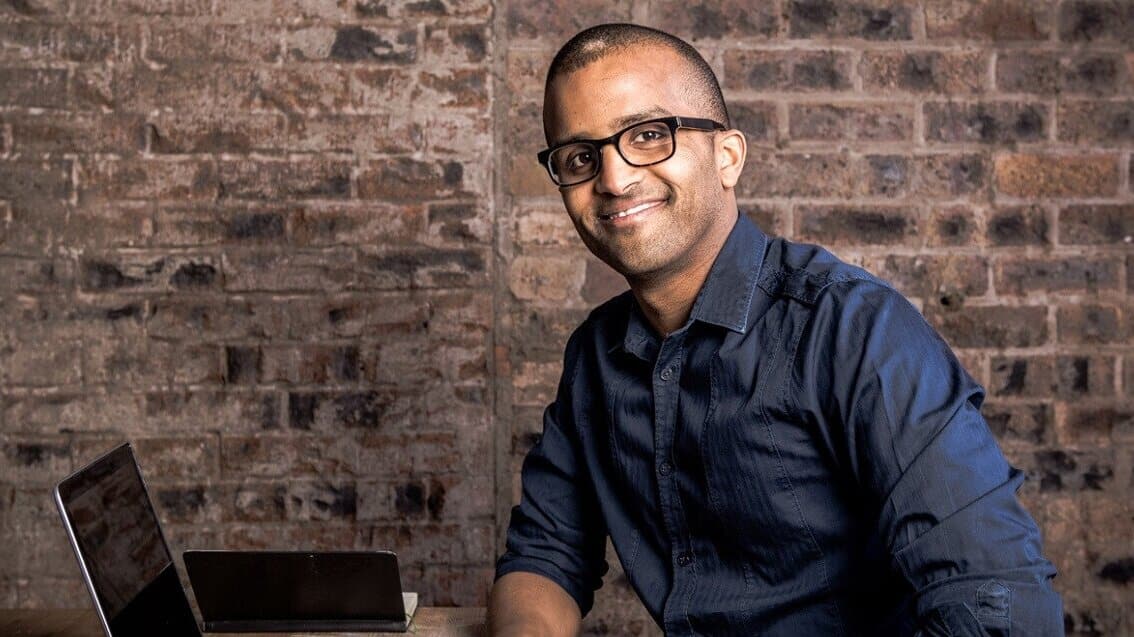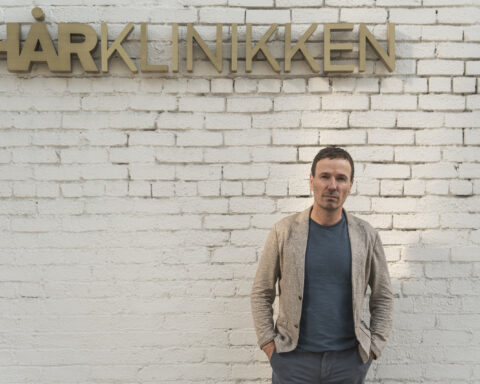I believe I was born deaf but am not entirely certain when it happened, whether it was from birth or a bit later. But I only got officially diagnosed when I was six years old. My speech was a bit behind as a toddler, and it got more noticeable over time. So to cut a long story short, my parents realized they needed to check my hearing out, and at six years old I was diagnosed as moderately to profoundly deaf. And then I started to learn how to process life.
I was born in Sudan and then lived in Saudi Arabia for a few years. Then my family and I moved to the UK, to Northern Ireland, in 1993 when I was eight years old. I had to learn English, as my first language was Arabic. And when you’re learning English as a deaf person, it’s a bit different to other people learning a language, because you tend to miss out on picking up certain sounds. I would mispronounce certain things and I still do that to some extent. I had to have some speech therapy, which was not really a fun experience; I was a teenager and I hated it. But it was necessary and important for me to learn how to pronounce certain letters. For example, I still can’t really tell the difference between ’sh’, and ‘ch’ — so when you pronounce ’sheep’ and ‘cheap’, I can’t really work out the difference. I have to read or listen out for the context of the whole sentence, and only then will I know which word is it supposed to be.
Even today, to listen to people speak is hard work, and deaf and hard of hearing people get what’s called concentration fatigue, or sometimes known as listening fatigue. And basically, it’s that we have to focus intensely on what the other person is saying, and your brain is working extra hard and you’re using more cognitive energy to work out what that person is saying. To get that information in and to process it is a lot of work. So, after a long day at work or in the past, at school or university, I’m always exhausted because of the constant listening, with or without hearing aids. Right now, I’m a marketing manager for a remote software company and it’s lots of video calls from my home in Edinburgh, Scotland, which can really sap my energy.

Ahmed Khalifa
So that is why the topic of meditation is so interesting to me. Because I’m into the whole concept of mindfulness, being present and being still. When you are in a hearing world, your mind is constantly switching and trying to catch up with the voices and sounds around you. It’s hard to get away from that. And it’s even more difficult when many methods of communication are done in noisy environments, whether it’s in-person or virtually, and that adds to the strain because you are trying to pick up the sounds even more amidst the loud noises. But meditation, and being present, being mindful and being still, plays a part in calming my hard-at-work brain. Unless you have an open mind about it, it’s easy to be dismissive about the idea of meditating. I used to think it’s all ‘woo-woo’ but I now find it very beneficial. Sometimes I do breathing exercises, but a lot of time, it’s just about being somewhere quiet and being present.
When I started to get into meditation, I used apps like Headspace like a lot of people do, and I learned certain things that I found quite useful. But then, over time, I realized that guided meditations were stressful for me. When you meditate you want to relax, but I had to work extra hard to listen to what the person guiding the meditation was saying. So I tried to work out other ways I could do it. I experimented with different things and I took my experience with guided meditation into non-guided meditation, which I now prefer. It is basically meditating with no voice, but there are constant sounds you can use to calm the mind like sound effects, animal sounds, rainfall, or something like the sound of a fan. So I use various tools on YouTube or Spotify, or Brain FM that I find helpful. Listening to white noise, or sounds that are designed to make you focus or relax, allows me to not concentrate too much on what is actually going on within the sounds.
Now obviously, for those who are more profoundly deaf, these sounds are not going to work. And to be honest, I’m not the best person to advise what that person can do. But I hope there’s something out there, like some kind of sign language guided meditation, or some kind of Cognitive Behavioral Therapy, where you’re kind of just talking to each other and learning how to wind down, relax and breathe, that can help these people.
What also works really well for me, when it comes to mindfulness, is to journal. I love words, I love to read and to write. I like to write what I’m feeling and I’m thinking in my journal, and processing that by pen and paper. I find that very helpful because it doesn’t matter that I’m deaf, I can just write, and it doesn’t matter how I do it, the structure and the format is up to me. I don’t like to listen all the time because it’s hard work, but when it comes to reading and writing, I can feel more relaxed. I absolutely love reading books in general, whether it’s for relaxing, entertainment or learning.

Ahmed Khalifa
I also love music, but I have a different kind of appreciation of music than most people. For one thing, I play the acoustic guitar. I’ve always preferred acoustic over electric because I feel more connected with the sounds and feel very comfortable with it. And with that, it allows me then to appreciate music in a different light. When I listen to music, I can’t work out what the singer is saying, I have to read the lyrics to work it out. But instead, I listen to how that person is singing it and the tone they are singing it in, combined with the melody of the musical instrument. So I listen to a combination of voice melody and instrumental melody. That’s the way for me to process music, to allow me to relax and enjoy it instead of constantly listening hard to what that person is saying which just gets more stressful, and is not very relaxing or meditative.
One thing that I found very therapeutic is starting Hear Me Out! [CC], where I create blog posts, podcasts and videos about deaf awareness. It’s a form of expression for me, like art, and it ended up being helpful for other people too. This can be from my personal perspective, but a lot of it is about sharing stories and information about how a person (whether hearing or deaf) can solve a particular problem. For example, a popular video and blog post I created is about concentration fatigue. This particular video connected with a lot of people who then felt less alone, more validated and relieved that they share their struggles with others. The feedback is overwhelming, which I’m very grateful for. But a lot of the content also helps hearing people to understand us better — for example, what a hearing aid can and can’t do. (Spoiler alert: it doesn’t ‘cure’ my deafness nor does it make it ‘normal.’ It’s there to support us).
Over the past few years, I’ve been very interested in reading about Stoicism and I found that very beneficial. It’s somewhat linked with mindfulness because it teaches you to be present, and acceptance of yourself and the surrounding world. You have to accept that you can’t control things that are out of your control. So since we live in a hearing world, I have to accept that. Since I am living with deafness, I (eventually, after many years of denial) accepted that. That allows you to then be mindful of who you are as a person, where you are and how you want to live your life. A couple of my favorite books about Stoicism is ‘The Daily Stoic‘ where you read one page a day to soak in the information and learn how to implement it in your life. My other favorite book is ‘The Obstacle Is The Way‘ which uses Stoicism to help you understand that, even with those challenges and barriers in front of you, you are on the right track to something really great.
I think that’s a really good way of looking at life’s challenges.











